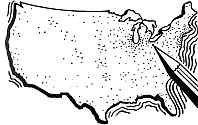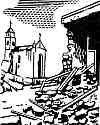 We sent out good citizens
to other cities and
towns and in turn received many new members to our own community. Taken
individually, the contributions of one such group may seem very small -
but when multiplied by thousands, they add greatly to the might of
America, which has no equal in the world. We sent out good citizens
to other cities and
towns and in turn received many new members to our own community. Taken
individually, the contributions of one such group may seem very small -
but when multiplied by thousands, they add greatly to the might of
America, which has no equal in the world.We, in this community, are very appreciative of the concerts which Maestro Toscanini dedicated to the Armed Forces because some 600 boys and girls from our Main Street and farms are in the war. They are in the four corners of the earth and on the seven seas. Some are actually fighting in the Maestro's native land.  Although the battle fronts
against the dictators are far from home, the boys are also fighting for
the continuation when they get back of the privilege of deciding if
they want to live on a farm, in a small town or a big city - what they
want to do to earn a living and how they want to think and worship. On
the battle fronts they are seeing first hand what happens to people who
have been deprived of these very simple, but tremendously important
things.
Although the battle fronts
against the dictators are far from home, the boys are also fighting for
the continuation when they get back of the privilege of deciding if
they want to live on a farm, in a small town or a big city - what they
want to do to earn a living and how they want to think and worship. On
the battle fronts they are seeing first hand what happens to people who
have been deprived of these very simple, but tremendously important
things. |








